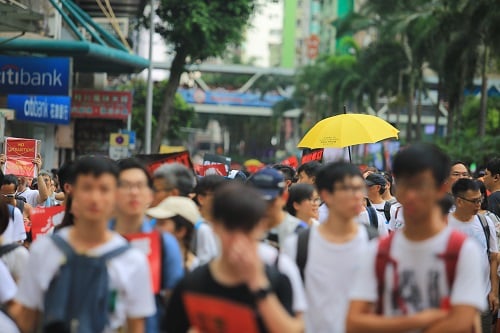Millions protesting an extradition law between Hong Kong and Mainland China could have far-reaching consequences

With political upheaval in Hong Kong, which has seen millions take to the streets to protest an extradition law with Mainland China, speculation is rampant that a rush of new residents will make their way to Vancouver.
If that happens, there could be implications for domestic homebuyers, many, if not most, of whom are already struggling to get a foothold in the local real estate market.
“The younger people who are trying to purchase homes right now are already sidelined because of the cost of real estate in Vancouver and what I think is a very punitive stress test,” said Vancouver-based mortgage broker Robert Mogensen. “If the political situation in Hong Kong causes people to flee and many choose Vancouver, it will only make the situation worse for younger people already living in the city.”
Granted, Hong Kong money would be nothing new for Vancouver. Anticipating the territory’s turnover to China in 1997, money began flowing into Vancouver from Hong Kong in the late ‘80s, however, much has changed since then.
“A lot of Hong Kong residents have, over the years, been buying property in Vancouver, so I’m not sure there would be a great rush, although, to some degree, I’m sure there will be people coming here if unrest in Hong Kong continues, and that will worsen the existing problem,” continued Mogensen.
Mike Michelin, a mobile mortgage advisor with CIBC who’s based in Vancouver, says the industry has been abuzz with speculation this week that Hong Kong residents, fearful of relentless encroachment from Mainland China, will flock to Canada rather than only to the west coast metropolis.
“There’s been buzz around town from industry brokers that there could be an influx of people from Hong Kong, but we’ll have to see whether it will have an impact on the market here,” said Michelin. “We’ve heard between 150,000 to 170,000 would be coming back to Canada from Hong Kong, but, for the most part, I think they’ll go to the GTA because Toronto is a centre and there are better chances of employment there. It will be interesting to see if we get a spike.”
While new residents would certainly inject life into Vancouver’s reeling real estate market, Michelin admits that news of yet more foreign money must make younger people chary.
“If you’re a Canadian resident aged 25 to 30 and just starting out your career, it might not be very positive because it will impact prices, making them go up,” he said. “If you want to sell your home, it could be a good thing, but for first-time buyers it will be a challenge if prices rebound and go up.”
While Mogensen believes Vancouver’s become too fragile to sustain more capital inflow from abroad, he noted that Mainland Chinese money is the culprit. Yet, irrespective of the money’s provenance, younger Vancouverites’ frustrations are palpable in the city.
“They’re very fearful that the situation is getting worse and they’re very frustrated, not to mention disillusioned, with the government because it allowed this to happen as it stood idly by, happy to collect taxes at the expense of Canadians who want to buy property in Vancouver,” he said. “It’s sad because a lot of younger people are leaving the city for other parts of the province and country, or if they’re staying they feel hopeless. Their incomes in no way, shape or form allow them to buy much real estate in Vancouver or even the Greater Vancouver Area.”



